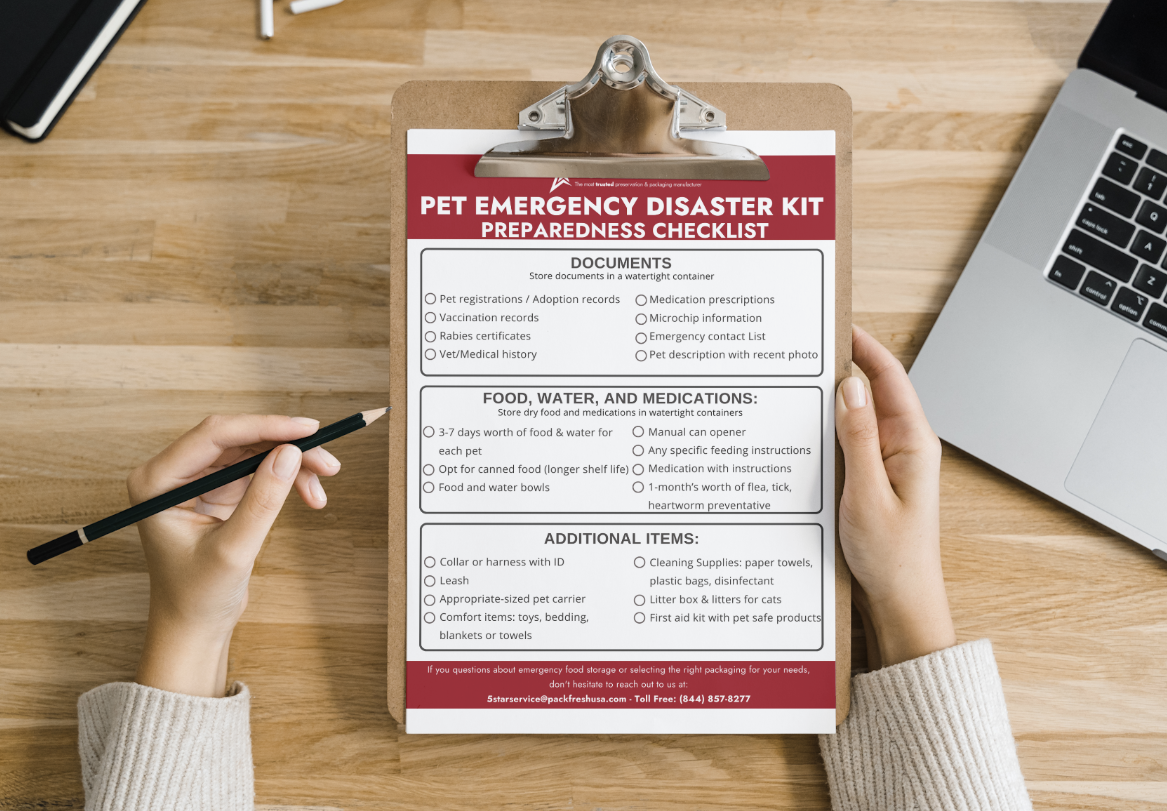Pet Emergency Disaster Preparedness
Posted by Marvin C on Sep 12th 2023

As September arrives, we find ourselves amidst National Preparedness Month, a time dedicated to ensuring our readiness for unforeseen emergencies. While we often consider our own safety and well-being during such times, it's crucial not to overlook the needs of our furry companions. This September, let's embark on a journey to safeguard our pets by creating a comprehensive Pet Emergency Kit. From natural disasters to unexpected crises, this month provides the perfect opportunity to equip ourselves with the knowledge and tools necessary to keep our beloved animal friends safe and secure. Join us as we delve into the essential steps to prepare a Pet Emergency Kit that will serve as a lifeline for your pets in times of need. We'll be discussing what to do before, during, and after an emergency, ensuring that your pets receive the care and attention they deserve in all circumstances.

Before the Emergency
Preparing for an emergency involves several essential steps, and one of the foremost is creating a Pet Emergency Kit. Here's a comprehensive checklist to ensure you have everything your pet needs:
Documents:
Store these vital documents in a watertight container.
- Pet registration and any adoption records
- Vaccination records and rabies certificates
- Vet/Medical history
- Medication prescriptions
- Microchip information
- Emergency contact list
- Pet description and recent photos of each pet
Food, Water, and Medications:
- Store dry food and medications in watertight containers
- Pack three to seven days' worth of your pet's regular food and fresh water.
- Opt for canned food for longer shelf life.
- Use airtight containers if storing dry foods.
- Food and water bowls
- Manual can opener
- Medication with instructions
- Any specific feeding instructions
- One month's worth of flea/heartworm/tick preventative
Additional Items:
- Well-fitted collar or harness with ID containing current contact information
- Leash
- Appropriate-sized pet carrier
- Comfort items: toys, bedding, blankets, or towels for comfort and stress reduction
- Cleaning supplies: paper towels, plastic bags, disinfectant
- Litter box and litter for cats
Emergency Contact List - Create an emergency contact list to add to your kit, include:
- Pet owner’s name, address, phone numbers, email address
- Possible emergency caregivers' names, addresses, phone numbers, and email addresses
- Your pet’s veterinary or local animal hospital’s name, address, phone number, and email address
Pet Information Sheet- Write down detailed descriptions for each of your pets, include:
- Name and nicknames
- Species (e.g., cat, dog, rabbit, etc.)
- Date of birth or approximate age
- Sex
- Breed
- Distinctive features, markings, colors
- Microchip Information
- Required medical, allergy, and dietary care
- Registration/License #
- A recent photo
Additional Pre-Emergency Preparedness Measures:
- Ensure your pet is microchipped if not already done so
- Identify pet-friendly shelters, boarding facilities, or hotels in your area or along your evacuation route.
- Make a list of these places along with their contact information and any specific requirements for pet admission.
- Practice getting your pets accustomed to being in their carriers or crates to reduce stress during evacuation.
During the Emergency
Stay Informed
- Monitor local news, weather reports, and emergency alerts to stay informed about the situation.
- Follow evacuation orders and instructions from local authorities. Your pets' safety is paramount.
Evacuation
- Move quickly but calmly. Secure your pets in carriers or on leashes to prevent them from escaping in the chaos.
- Take your Pet Emergency Kit with you as you evacuate.
- Ensure your pets are wearing their ID tags at all times.
- If a pet is being transported outside a carrier be watchful of any possible hazards they may step on, such as broken glass or loose wires.
Calm and Comfort
- During an emergency, pets can become anxious or frightened. Keep them calm by providing reassurance, comforting items, and their favorite toys.
Maintain Their Routine
- As much as possible, stick to your pets' regular feeding and bathroom schedule. This will help reduce their stress during the crisis
After the Emergency
Reunification and Recovery
- Once it's safe to return home, ensure your environment is safe for your pets before bringing them back.
- Check for hazards like loose wires, broken glass, or contaminated water.
- If your pet got separated during the emergency, contact local shelters and animal control to inquire about lost pets.
- Update your pet's microchip information if necessary.
- Perform a health check by a veterinarian to ensure your pet has no medical issues.
Evaluate and Restock Your Kit
- After the emergency, assess your Pet Emergency Kit to replace any expired or used items.
- Restock food, water, and medications to ensure you're prepared for the next crisis.
This National Preparedness Month, let's come together as a community of responsible pet owners and ensure that our beloved pets are well taken care of during emergencies. Pet emergency disaster preparedness is an essential responsibility for every pet owner. By creating a comprehensive Pet Emergency Kit and understanding what to do before, during, and after an emergency, you can help ensure the safety and well-being of your furry family members during challenging times. Remember, your pets rely on you for their safety and comfort, so being prepared is the best way to protect them in times of crisis.
Don’t forget to send us a picture of your pet along with a brief bio and what they like to keep fresh with PackFreshUSA® packaging or how they are prepared for emergencies. We'll feature a lucky pet every week on our social media accounts. Plus, you'll win a free gift if featured!
Stay tuned for more informative blog posts this National Preparedness Month on how to be prepared for other types of emergency events.
If you questions about emergency food storage or selecting the right packaging for your needs, don't hesitate to reach out to us at:
5starservice@packfreshusa.com - Toll Free: (844) 857-8277

